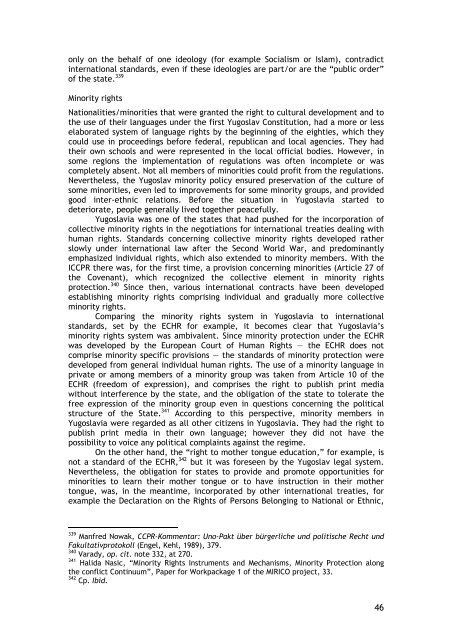Theory and practice of human Rights and minority rights ... - EURAC
Theory and practice of human Rights and minority rights ... - EURAC
Theory and practice of human Rights and minority rights ... - EURAC
Create successful ePaper yourself
Turn your PDF publications into a flip-book with our unique Google optimized e-Paper software.
only on the behalf <strong>of</strong> one ideology (for example Socialism or Islam), contradict<br />
international st<strong>and</strong>ards, even if these ideologies are part/or are the “public order”<br />
<strong>of</strong> the state. 339<br />
Minority <strong>rights</strong><br />
Nationalities/minorities that were granted the right to cultural development <strong>and</strong> to<br />
the use <strong>of</strong> their languages under the first Yugoslav Constitution, had a more or less<br />
elaborated system <strong>of</strong> language <strong>rights</strong> by the beginning <strong>of</strong> the eighties, which they<br />
could use in proceedings before federal, republican <strong>and</strong> local agencies. They had<br />
their own schools <strong>and</strong> were represented in the local <strong>of</strong>ficial bodies. However, in<br />
some regions the implementation <strong>of</strong> regulations was <strong>of</strong>ten incomplete or was<br />
completely absent. Not all members <strong>of</strong> minorities could pr<strong>of</strong>it from the regulations.<br />
Nevertheless, the Yugoslav <strong>minority</strong> policy ensured preservation <strong>of</strong> the culture <strong>of</strong><br />
some minorities, even led to improvements for some <strong>minority</strong> groups, <strong>and</strong> provided<br />
good inter-ethnic relations. Before the situation in Yugoslavia started to<br />
deteriorate, people generally lived together peacefully.<br />
Yugoslavia was one <strong>of</strong> the states that had pushed for the incorporation <strong>of</strong><br />
collective <strong>minority</strong> <strong>rights</strong> in the negotiations for international treaties dealing with<br />
<strong>human</strong> <strong>rights</strong>. St<strong>and</strong>ards concerning collective <strong>minority</strong> <strong>rights</strong> developed rather<br />
slowly under international law after the Second World War, <strong>and</strong> predominantly<br />
emphasized individual <strong>rights</strong>, which also extended to <strong>minority</strong> members. With the<br />
ICCPR there was, for the first time, a provision concerning minorities (Article 27 <strong>of</strong><br />
the Covenant), which recognized the collective element in <strong>minority</strong> <strong>rights</strong><br />
protection. 340 Since then, various international contracts have been developed<br />
establishing <strong>minority</strong> <strong>rights</strong> comprising individual <strong>and</strong> gradually more collective<br />
<strong>minority</strong> <strong>rights</strong>.<br />
Comparing the <strong>minority</strong> <strong>rights</strong> system in Yugoslavia to international<br />
st<strong>and</strong>ards, set by the ECHR for example, it becomes clear that Yugoslavia’s<br />
<strong>minority</strong> <strong>rights</strong> system was ambivalent. Since <strong>minority</strong> protection under the ECHR<br />
was developed by the European Court <strong>of</strong> Human <strong>Rights</strong> — the ECHR does not<br />
comprise <strong>minority</strong> specific provisions — the st<strong>and</strong>ards <strong>of</strong> <strong>minority</strong> protection were<br />
developed from general individual <strong>human</strong> <strong>rights</strong>. The use <strong>of</strong> a <strong>minority</strong> language in<br />
private or among members <strong>of</strong> a <strong>minority</strong> group was taken from Article 10 <strong>of</strong> the<br />
ECHR (freedom <strong>of</strong> expression), <strong>and</strong> comprises the right to publish print media<br />
without interference by the state, <strong>and</strong> the obligation <strong>of</strong> the state to tolerate the<br />
free expression <strong>of</strong> the <strong>minority</strong> group even in questions concerning the political<br />
structure <strong>of</strong> the State. 341 According to this perspective, <strong>minority</strong> members in<br />
Yugoslavia were regarded as all other citizens in Yugoslavia. They had the right to<br />
publish print media in their own language; however they did not have the<br />
possibility to voice any political complaints against the regime.<br />
On the other h<strong>and</strong>, the “right to mother tongue education,” for example, is<br />
not a st<strong>and</strong>ard <strong>of</strong> the ECHR, 342 but it was foreseen by the Yugoslav legal system.<br />
Nevertheless, the obligation for states to provide <strong>and</strong> promote opportunities for<br />
minorities to learn their mother tongue or to have instruction in their mother<br />
tongue, was, in the meantime, incorporated by other international treaties, for<br />
example the Declaration on the <strong>Rights</strong> <strong>of</strong> Persons Belonging to National or Ethnic,<br />
339 Manfred Nowak, CCPR-Kommentar: Uno-Pakt über bürgerliche und politische Recht und<br />
Fakultativprotokoll (Engel, Kehl, 1989), 379.<br />
340 Varady, op. cit. note 332, at 270.<br />
341 Halida Nasic, “Minority <strong>Rights</strong> Instruments <strong>and</strong> Mechanisms, Minority Protection along<br />
the conflict Continuum”, Paper for Workpackage 1 <strong>of</strong> the MIRICO project, 33.<br />
342 Cp. Ibid.<br />
46

















